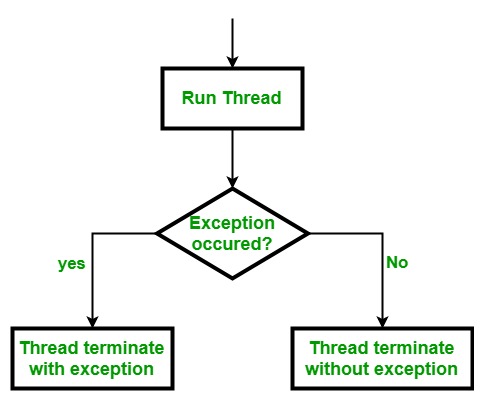Ruby | Exception Handling in Threads | Set 1 (original) (raw)
Last Updated : 12 Sep, 2022
Threads can also contain exceptions. In Ruby threads, the only exception arose in the main thread is handled but if an exception arises in the thread(other than main thread) cause the termination of the thread. The arising of an exception in a thread other than the main thread depends upon abort_on_exception method. The default value of abort_on_exception is false. When the value of abort_on_exception is false it means the unhandled exception aborts the current thread and the rest of the threads will continue running.
You can also change the setting of abort_on_exception by using a_bort_on_exception=true or $DEBUG to true_. Ruby threads also provided a method to handle the exceptions, i.e. ::handle_interrupt. This will method handle exceptions asynchronously.
Example:
Ruby `
Ruby program to illustrate
the exception in thread
#!/usr/bin/ruby
threads = [] 4.times do |value|
threads << Thread.new(value) do |a|
# raising an error when a become 2
raise "oops error!" if a == 2print "#{a}\n" end
end threads.each {|b| b.join }
`
Output:
0 3 1 main.rb:12:in `block (2 levels) in ': oops error! (RuntimeError)
Note: Thread.Join method is used to wait for the finishing of a particular thread. Because when a Ruby program terminates, all the thread are killed, irrespective of their states. We can also save the exception as shown in the below example:
Example:
Ruby `
Ruby program to illustrate how to
escape the exception
#!/usr/bin/ruby
threads = []
5.times do |value| threads << Thread.new(value) do |a| raise "oops error!" if a == 3 print "#{a}\n" end
end
threads.each do |x| begin
x.join
using rescue method
rescue RuntimeError => y puts "Failed:: #{y.message}" end end
`
Output:
0 1 4 2 Failed:: oops error!
Now set the value of abort_on_exception= true, it kills the thread which contains an exception. Once the thread is dead, no more output will produce.
Example:
Ruby `
Ruby program to illustrate the killing
of thread in which exception raised
#!/usr/bin/ruby
setting the value of abort_on_exception
Thread.abort_on_exception = true
threads = []
5.times do |value| threads << Thread.new(value) do |a| raise "oops error!" if a == 3
print "#{a}\n" end
end
using Thread.Join Method
threads.each {|b| b.join }
`
Output:
0 1 2 main.rb:13:in `block (2 levels) in ': oops error! (RuntimeError)
The execution of thread(other than main thread) as shown below: 